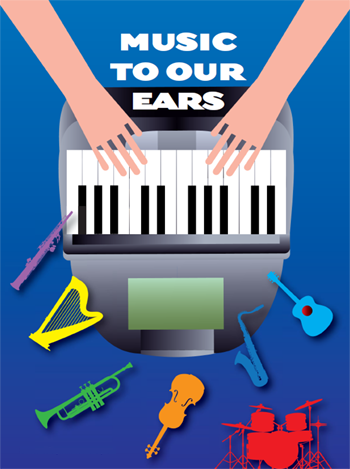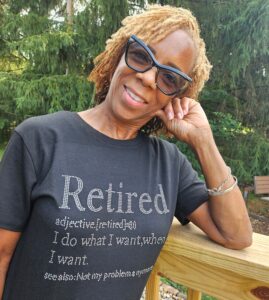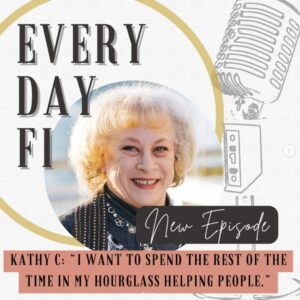Court reporters chime in on how playing musical instruments helped with their careers.
When kids learn an instrument, teachers sometimes tell them “you’re a natural” or “you have a great ear.” It’s true that many are born with talent, but for most, it’s a combination of talent and hard work. In other words, it doesn’t come easily. There are endless hours of practice to hone skills and become great musicians — which is also true about court reporting.
So this made us wonder — does it make a difference in how reporters get through school and get a start in the field if they have a musical background? Does playing an instrument help with finger dexterity on a writer? Does the experience of hearing notes, reading music, or playing in a band help with captioning the spoken word? To get to the bottom of this, we spoke to several court reporters who have spent years playing instruments.
A HEAD START
 Linda Fritsch, RMR, from Largo, Fla., has worked as a deputy official court reporter and has done depositions and civil court work. Fritsch started playing the piano when she was eight years old and continued studying music in college after playing in the high school orchestra. When she started court reporting school, she found playing music gave her a head start in the program.
Linda Fritsch, RMR, from Largo, Fla., has worked as a deputy official court reporter and has done depositions and civil court work. Fritsch started playing the piano when she was eight years old and continued studying music in college after playing in the high school orchestra. When she started court reporting school, she found playing music gave her a head start in the program.
“I definitely think learning to read music and developing finger dexterity in playing the piano were a big help in learning court reporting. Learning and practicing steno theory requires the same skills needed to read music and play an instrument,” Fritsch says. She adds playing chord formations on the piano is like writing out phonetic words. “In learning to read music, you look at symbols on a page, and then you translate those symbols through your fingers to different keys on the instrument. In learning reporting, you study steno theory, which involves memorizing the letter formations that produce phonetic sounds. When writing, you hear the phonetic sounds and, in turn, translate the phonetic sounds through your fingers to the appropriate keys on the steno keyboard.”
Fritsch adds that if you love what you do, as in theory and the steno writer, this should provide students the determination to keep practicing. In fact, she says the quicker you are to recognize notes or sounds, the quicker you will be able to respond to the keyboard. Even so, she thinks practicing is the important part. “Repetition is what builds one’s reflexes, both on the piano and the writer,” Fritsch says. “Practice makes perfect, as the old saying goes.”
PRACTICE MAKES PERFECT
 When it comes to playing, you either stick with one instrument or you play several. In Victoria (Tori) Pittman’s case, she started with piano then picked up the oboe, violin, baritone sax, and bass violin. Pittman, RPR, from Wake Forest, N.C., was in the school orchestra and was also in an allcounty band as well as an all-county orchestra and the Mohawk Valley Symphony. To say she’s accomplished is an understatement. She no longer plays these instruments due to the time needed to practice, but her musical experience has helped in many ways when it comes to court reporting.
When it comes to playing, you either stick with one instrument or you play several. In Victoria (Tori) Pittman’s case, she started with piano then picked up the oboe, violin, baritone sax, and bass violin. Pittman, RPR, from Wake Forest, N.C., was in the school orchestra and was also in an allcounty band as well as an all-county orchestra and the Mohawk Valley Symphony. To say she’s accomplished is an understatement. She no longer plays these instruments due to the time needed to practice, but her musical experience has helped in many ways when it comes to court reporting.
“Having the manual dexterity and the hand-eye-ear coordination definitely helps. You can feel and hear when your fingers are in the wrong place,” Pittman says. She also mentions a rule her high school band leader kept. “He always said, ‘If you’re on time, you’re late.’ Meaning your music is up and ready, and you should be ready to play when the time for brand practice hits. I was never late for class. Ever!” Pittman adds that because she had to practice to get a piece right, she knew it wasn’t going to just magically hap ; she knew that it would take a lot of effort.
Pittman is not sure about the correlation between music and court reporting in regard to attaining her skills faster, but in other ways, she thinks it has helped.
“The fact that I already had the ability to not watch my hands and let them do what they needed to do (as when reading music) made it easier for me when I had to listen for words but not watch my fingers as they tried to write them (trusting one’s notes, if you will),” Pittman says. This background has also helped overall in her profession. Having punctuality drilled into her head while in band class made her very conscious about being early, setting up, and being ready to go before anyone gets in the room. On a final note, Pittman says, “After a good performance, you don’t really remember what you did, you only remember how it felt. If someone were to ask me the topic of a hearing/deposition, I probably could only give the very basics. I get subsumed by the ‘music’ as it were and let myself flow with it. I no longer think about it.”
LEARN LIFE THROUGH MUSIC
 Just like the variety of court reporting professions, there are also a variety of types of musicians. Michelle Grimes is a freelance court reporter from Joliet, Ill., who has been a drummer since she turned eight years old. She started taking lessons and had formal training during grade school.
Just like the variety of court reporting professions, there are also a variety of types of musicians. Michelle Grimes is a freelance court reporter from Joliet, Ill., who has been a drummer since she turned eight years old. She started taking lessons and had formal training during grade school.
After a while, she wanted her own drum set, but her parents weren’t too keen on the idea. So she waited, and at 19 years old, with determination and a little luck, she bought her own after selling a fax machine she won in a Chicago radio contest. Once she got the set, she started playing in a few rock bands at festivals, benefits, and clubs in the Chicago area. Then, she took time off, but for a good reason — court reporting school.
“After a five-year hiatus of not playing so I could get through court reporting school and begin my career, I have recently returned to playing for myself, not in a band, and I am working on honing my hobby with more technical stuff as my time and schedule allows,” Grimes says. She adds that playing the drums is her reward for getting work and other necessities done.
“The biggest lesson playing drums has taught me is that in order to become very proficient and skilled at something, it takes a lot of practice, dedication, concentration, discipline, and perseverance. It’s hard work. There is no easy way to get there. It has taught me discipline and dedication, and it has helped my concentration. All of that is necessary, I believe, to becoming a skilled and proficient writer,” Grimes says.
This thought actually helped with her decision to put playing on hold while in school. Grimes says, “I knew that if I had my drums around, I’d be more tempted to play them than practice on my steno machine, so I had to put them away, which was really difficult for me. I missed them dearly. Thankfully, we are happily reunited.” While some people think that musicians might listen better, Grimes points out a different similiarity: “I notice that there is a natural cadence or tempo in which most people talk. The drummer is the keeper of the time for the whole band. I often connect with a person’s cadence of speech while I’m writing. Syllables are to words as notes and beats are to drums — for me, anyway.” Grimes also sees how reading music has helped. In fact, she mentions punctuation and grammar author Margie Wakeman Wells’ theory that reading the written steno notes creates “grooves in the brain” and improves muscle memory.
“Muscle memory is taught in both court reporting and drumming. It dee s as our eyes see and recognize the steno outlines and music notes. I think reading music creates grooves in a similar way,” Grimes says. Even though at one point she wanted to be a professional drummer, she chose the court reporting field because the Bureau of Labor Statistics said there were more jobs than people to fill them.
After her five-year hiatus of drum playing, Grimes is happy to be back on her drummer’s throne and comments how drumming has taught her a lot of lessons about life and court reporting. “Playing set the foundation to help me get through many challenges of court reporting — dedication, determination, overcoming defeat and disappointment, celebrating successes, facing new challenges, and relieving stress,” she says.
EAR-HAND COORDINATION
 For Lori Judd, RMR, a freelance reporter from Las Vegas, Nev., it wasn’t as much about relieving stress as it was about learning something new. So when she turned 40 years old, she bought a harp. Even though she had a lot of music experience and a degree in music performance, Judd confesses to being a beginner.
For Lori Judd, RMR, a freelance reporter from Las Vegas, Nev., it wasn’t as much about relieving stress as it was about learning something new. So when she turned 40 years old, she bought a harp. Even though she had a lot of music experience and a degree in music performance, Judd confesses to being a beginner.
“I knew from my previous music study that I needed to practice at least a little every day,” Judd says. This practice paid off because now, 15 years later, Judd plays gigs all over Vegas and is the principal harpist for the Henderson Symphony Orchestra. “More than anything, I think the skill that reporters develop is an ear/hand coordination. Musicians have the ear/hand coordination, too. Musicians have to learn a new language — reading music — and become proficient at thinking in terms of notes and chords, and reporters also learn a new language — steno — and become proficient at thinking in steno,” Judd says.
Judd adds that she doesn’t think reporters are eye/hand coordination experts. She thinks they’re ear/hand coordination experts. “Yes, we often watch the people producing the sounds that we capture, but we take the spoken words using our ears and convert them to written words. And playing an instrument certainly helps me listen more carefully.”
Learning the harp as an adult has affected Judd differently from learning other instruments, and is an inspiration to court reporters who have taken up the profession as a career change. “It can be daunting to start something difficult later in life. The best advice that I could give is to just keep showing up to your lessons (or to classes) no matter what, and you need, need, need to be sure that you get some time on your machine (or instrument) every day, even if it’s just five minutes.” Judd says that she was disciplined, and that made the difference. It wasn’t always quality practicing, but she played nearly every day and still does. “Even when I didn’t feel I was ready for a lesson, I would still show up.”
DRILL IT IN
 Rich Germosen of North Brunswick, N.J., readily recalls how music helped when it came to court reporting school. As a saxophone player since the fifth grade, which included participation in the concert, marching, and stage bands, Germosen vividly remembers the first week of court reporting school.
Rich Germosen of North Brunswick, N.J., readily recalls how music helped when it came to court reporting school. As a saxophone player since the fifth grade, which included participation in the concert, marching, and stage bands, Germosen vividly remembers the first week of court reporting school.
“We were all doing finger drills, and when we got to the ring finger, everyone was moaning and groaning at how hard it was to drill the ring fingers. I was doing the ring fingers pretty quickly, and I remember looking around wondering why everyone else thought it was so difficult,” Germosen says.
Even though he no longer plays the saxophone, Germosen be lieves playing has continued to help him in his career. “Playing an instrument is sort of like writing on the steno machine. The more you practice, the better you get. All that practicing an instrument sort of set the stage for practicing on the machine in school. But I think I didn’t notice all that until after I was out of school and reflecting back over the years,” says Germosen. It also taught him how to practice consistently, and as he states, court reporting school is all about building skills on the machine by practicing a lot.
He successfully finished school in just a little more than 22 months and passed the New Jersey CSR on the first try. “I wanted to pass the first CSR I took so I did a total of five hours a day of practice on the machine from June through October.” He’d wake up at 5 a.m. and do two hours before school, then practice for three hours at school from 3 p.m. to 6 p.m. All that practice has paid off, and he has been busy with work ever since.
“If you ask me, I was supposed to learn how to play the saxophone to prepare me for a lifetime of writing on my machine. And here I am, almost 21 years later,” he says.
STRIVE FOR PERFECTION
 Some of our musicians never really thought they’d make a profession out of it, but Diane Hromek, who splits her time between Florida and Wisconsin, wanted to be a concert pianist. That meant a grueling practice schedule that included repeating classical music 15 to 20 times daily. “I was the piano soloist at Riverside-Brookfield High School in Illinois. I sometimes memorized more than 80 pages at a time,” Hromek says. But one day, her mother said something she’ll never forget: “You know, dear, you are not going to make a living doing that.”
Some of our musicians never really thought they’d make a profession out of it, but Diane Hromek, who splits her time between Florida and Wisconsin, wanted to be a concert pianist. That meant a grueling practice schedule that included repeating classical music 15 to 20 times daily. “I was the piano soloist at Riverside-Brookfield High School in Illinois. I sometimes memorized more than 80 pages at a time,” Hromek says. But one day, her mother said something she’ll never forget: “You know, dear, you are not going to make a living doing that.”
“I was shocked!” Hromek recollects. “That’s what I thought I’d be doing.” She took what her mom said to heart. Soon thereafter, she spotted an ad in the Chicago Tribune talking about court reporting school.
“When I was 16, Mom and I, with Dad’s approval, went to visit the school. I signed up,” Hromek says. During the time she went to court reporting school, she had to stop practicing piano, which broke her heart. But since she was used to practicing the piano 3 to 5 hours a day, she put that energy into her steno machine. Those years of playing the piano, especially preparing to perform, caused Hromek to strive for perfection. “Everyone can hear if I make a mistake. That comes pretty close to writing realtime, as I do for every job. So, I believe there is a close correlation between the two,” she says.
Hromek still plays the piano, but mostly at her home. It gives her a relief from stress that builds up with life or work. “Even after many hours of writing on my steno machine or editing on my computer, even if my back is aching and my head is tired, I still find myself sitting down to play a song. In fact, ‘play a song’ is a phrase I used daily. I say to my retired husband, ‘I think I will go play a song.’ He says, ‘Go play a song.’ [But] I seldom only play one song,” she says.
Now at age 63, Hromek believes the exercise from playing the piano has given her hands and arms exceptional durability. And she fondly remembers how much she loved playing at a younger age. “When I moved away from my childhood home to Chicago, my first piece of furniture was a brand-new Chickering baby grand piano. I didn’t know how they would get it up to the 47th floor in the elevator, but they did. I bought that before I bought a bed. I knew I could always sleep on the floor, if I had to, but I couldn’t live without a piano,” she says.
IT TAKES DISCIPLINE
 Our list of musicians wouldn’t be complete without a clarinet and guitar player. Linda Breech, RPR, from Santa Clarita, Calif., is an official reporter for the Los Angeles Superior Court. She started out with piano at age six, then moved on to clarinet and guitar in middle and high schools, where she, like Germosen, played in the marching band.
Our list of musicians wouldn’t be complete without a clarinet and guitar player. Linda Breech, RPR, from Santa Clarita, Calif., is an official reporter for the Los Angeles Superior Court. She started out with piano at age six, then moved on to clarinet and guitar in middle and high schools, where she, like Germosen, played in the marching band.
“Learning the theory of reading music and finger dexterity and coordination gave me what I needed to adapt easily to the steno keyboard,” Breech says. And the discipline built in to practice made it come naturally. “I think the musical background very likely helps to create neural pathways in the brain to process sound and have it come through the fingers more accurately,” she says. After she saw an ad for the court reporting program, Breech progressed quickly through school. She said a light bulb went off. “I was interested in law but did not want to be a lawyer. I had excellent English/grammar skills, and I had the finger dexterity from my instruments, so I took to the steno machine very easily.” She says that music is still her first love, and it’s her favorite avocation. “It helped me launch quickly into a vocation that I still enjoy 20 years later and look forward to doing for the next 20.”
After speaking with our musically inclined court reporters, we can see how a combination of finger dexterity and hand-ear coordination played a part in helping them get through school and become successful reporters. But one thing is even more evident — s ding years practicing an instrument every day set the stage for court reporting school and passing the exams. It was, in a way, knowing what to expect, having s t all that time practicing something to perfection. In other words, even with capturing the spoken word, there are no short cuts. Would Rachmaninov, Joan Jett, or Miles Davis have been great reporters? Most likely — if they practiced for hours, were dedicated and highly disciplined, and could persevere.









